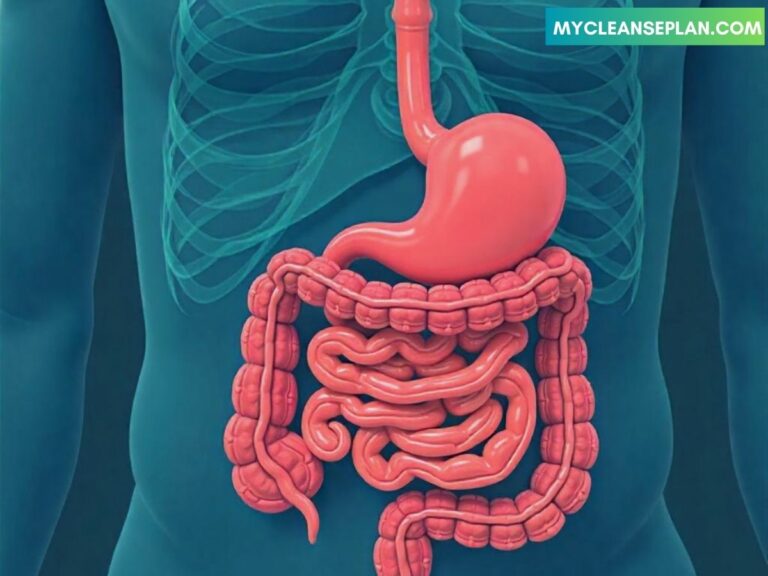10 Ways to Reduce Gut Issues When Eating Out
Key Takeaways
- Plan your meals beforehand to make healthier choices.
- Choose restaurants and menu items that align with your dietary needs.
- Learn to identify and manage trigger foods and eating habits.
- Practice mindful eating to improve digestion and reduce overeating.
- Incorporate probiotic-rich foods to support gut health.
Remember that amazing vacation dinner that turned into an evening of discomfort? We’ve all been there! Eating out, while enjoyable, can sometimes lead to unwelcome gut troubles.
The unfamiliar ingredients, the richer sauces, and the larger portions can all take a toll. This post is your guide to enjoying meals outside your home without the gut issues.
You’ll learn simple strategies to protect your digestive system and savor every bite. By following these 10 Ways to Reduce Gut Issues When Eating Out, you’ll be well-equipped to dine out with confidence.

The 10 Ways to Reduce Gut Issues When Eating Out
Dining out should be a pleasure, but sometimes, the excitement of new flavors can come with a side of digestive distress.
From hidden ingredients to the temptation of rich, unfamiliar foods, external dining presents unique challenges for your gut.
Fortunately, with a little forethought and some smart strategies, you can minimize the risk of digestive upset.
This guide provides ten practical and easily applicable tips to reduce the likelihood of gut issues, allowing you to enjoy your meals out and about.
By being proactive and making informed choices, you can protect your digestive system and experience the joy of dining without discomfort.
1. Research Restaurants and Review Menus in Advance
Before you even step foot in a restaurant, a little research can go a long way. Checking online menus allows you to view the food options and identify potential trigger foods.
Many restaurants also include information about ingredients and preparation methods on their websites.
This is a simple step, but the benefits are often overlooked. It helps you make healthier food choices that suit your digestive system.
Looking up a restaurant’s menu ahead of time enables you to plan your meal and avoid impulsive decisions that could cause problems.
For example, if you know you’re sensitive to dairy, you can check if a dish contains cream or cheese. If you have an allergy to gluten, you can look for gluten-free items.
You can also contact the restaurant directly to inquire about any specific ingredients or preparation methods.
Key Benefits of Pre-Planning
- Reduced Risk of Unpleasant Surprises: Knowing the menu beforehand helps you avoid ingredients you’re sensitive to.
- Better Informed Choices: You can choose restaurants that offer options suitable for your dietary needs.
- Stress Reduction: Planning ahead saves time and reduces decision fatigue when you’re already hungry.
- Improved Dietary Compliance: It’s easier to stick to your dietary goals when you’ve already made a plan.
2. Make Smart Choices and Modify Dishes
Once you’re at the restaurant, it’s time to put your planning into action. Examine the menu carefully and choose dishes that are prepared with your gut in mind.
Favor simple dishes with fewer ingredients and avoid items that are fried or heavily sauced. Ask your server about ingredient lists or preparation methods if you are unsure about something.
Don’t be afraid to customize your meal. Restaurants are usually accommodating when it comes to modifications.
You can request changes such as no sauces, dressings on the side, or an extra serving of vegetables.
Requesting that sauces are served on the side allows you to control the amount and type of sauce you consume. Choosing grilled or baked options over fried ones can also make a big difference.
Smart Choices to Consider
- Lean Proteins: Opt for grilled chicken, fish, or tofu instead of fried or breaded options.
- Whole Grains: Choose brown rice, quinoa, or whole-wheat bread over white rice or refined grains.
- Vegetables and Fruits: Load up your plate with colorful vegetables and fruits, which are high in fiber.
- Healthy Fats: Include healthy fats like avocado or olive oil, but use them in moderation.
3. Pay Attention to Portion Sizes
Restaurant portions are often larger than what your gut is used to. Overeating can lead to digestive issues such as bloating, gas, and abdominal pain.
A good tip is to share a dish, order an appetizer as your main meal, or ask for a to-go container as soon as your meal arrives. This allows you to control the amount of food you consume.
Another helpful method is to eat slowly and be mindful of how your body feels. This enables you to recognize when you’re full and avoid overeating.
Slowing down your pace allows your body time to signal satiety. It takes about 20 minutes for your brain to receive the signal that you are full.
Portion Control Strategies
- Share Dishes: Divide a meal with a friend or family member.
- Order Appetizers: Choose an appetizer as your main course to control the amount you eat.
- Take Leftovers: Pack leftovers immediately to avoid the temptation to overeat.
- Use Smaller Plates: Use smaller plates at buffets to keep your portions in check.
4. Identify and Avoid Trigger Foods
Everyone’s gut is unique, and certain foods can trigger symptoms like bloating, gas, or diarrhea. Common trigger foods include dairy products, gluten-containing foods, high-FODMAP foods (such as onions, garlic, and certain fruits), and processed foods.
The best way to identify your trigger foods is to keep a food diary and track how you feel after eating. This will help you find specific foods that are causing trouble.
When dining out, be mindful of ingredients and preparation methods. Ask your server about ingredients in dishes and request modifications to eliminate any known trigger foods.
For example, if you’re sensitive to dairy, ask for dishes without cream or cheese. Similarly, if you are gluten sensitive, check for gluten-free options and inform the staff about your needs.
Common Trigger Foods
- Dairy Products: Milk, cheese, ice cream, and other dairy items contain lactose, which can be difficult for some to digest.
- Gluten: Found in wheat, barley, and rye, gluten can trigger symptoms in people with celiac disease or gluten sensitivity.
- High-FODMAP Foods: Onions, garlic, apples, and beans can cause gas and bloating in sensitive individuals.
- Fried and Fatty Foods: These foods can slow down digestion and increase the risk of digestive distress.
5. Embrace Mindful Eating Practices
Mindful eating involves paying attention to your food and enjoying the experience of eating. It means taking the time to savor each bite, notice the flavors and textures, and pay attention to your body’s hunger and fullness cues.
This is a very helpful practice for improving digestion and preventing overeating. Mindful eating also helps you to avoid eating too quickly.
Start by eliminating distractions when eating, like turning off the television and putting away your phone. Focus on the taste, texture, and aroma of your food.
Chew each bite thoroughly and place your fork down between bites. Listen to your body and stop eating when you feel satisfied, not stuffed. Practicing mindful eating can significantly improve your digestive health.
How to Practice Mindful Eating
- Eat Slowly: Take your time and chew each bite carefully.
- Eliminate Distractions: Turn off the TV and put away your phone.
- Savor Each Bite: Pay attention to the flavors and textures of your food.
- Listen to Your Body: Stop eating when you feel full, not stuffed.
6. Manage Stress Before and During Meals
Stress can significantly impact your digestion, triggering symptoms such as bloating, abdominal pain, and changes in bowel habits.
High stress levels can disrupt the gut-brain axis, causing your digestive system to function erratically.
This is one of the many reasons why it is important to practice stress-reducing activities, especially before and during meals.
Before your meal, take a few minutes to relax. Deep breathing exercises can help to calm your nervous system.
During your meal, try to create a relaxed environment by conversing with your dining companions.
Avoid rushing or eating while stressed. By managing your stress, you can reduce the likelihood of gut issues and enjoy your meal more fully.
Ways to Manage Stress
- Deep Breathing: Take slow, deep breaths to calm your nervous system.
- Meditation: Spend a few minutes meditating to clear your mind.
- Gentle Stretching: Light exercise can help relieve tension.
- Conversation: Engage in pleasant conversation to create a relaxing atmosphere.
7. Choose Restaurants with Healthy Options
The type of restaurant you choose plays a big part in the health of your meal. Restaurants that focus on fresh, whole foods often provide more gut-friendly options.
These restaurants typically offer more choices that are prepared with simple ingredients and less added fat and sugar. They are more likely to offer healthier cooking methods like grilling, steaming, or baking.
Consider restaurants with a focus on fresh ingredients. Ethnic cuisines like Mediterranean or Japanese, can offer many healthy dishes.
You can also explore restaurants that cater to dietary restrictions. Vegetarian, vegan, and gluten-free restaurants offer numerous options. This is a great choice if you are looking for dishes that are easy on your digestive system.
Types of Restaurants to Consider
- Mediterranean Restaurants: These restaurants typically offer dishes that are rich in vegetables, lean proteins, and healthy fats.
- Japanese Restaurants: Options include sushi, sashimi, and miso soup that are typically lower in fat and heavily processed ingredients.
- Vegetarian and Vegan Restaurants: These restaurants often focus on plant-based foods that are high in fiber and low in processed ingredients.
- Farm-to-Table Restaurants: These restaurants source fresh, local ingredients, focusing on simple preparations.
8. Supplement with Digestive Aids (If Needed)
Sometimes, despite your best efforts, digestive issues can still arise. In these cases, supplements can offer a helping hand.
Before starting any supplements, you should discuss them with your healthcare provider. There are several options available that can support your gut health.
One common supplement is digestive enzymes. These enzymes help break down food, which can improve digestion and reduce symptoms like bloating and gas.
Probiotics, which are beneficial bacteria, can also be helpful. They can help balance the gut microbiome and reduce digestive discomfort.
If you are experiencing occasional constipation, fiber supplements may help to keep things moving. Always follow the instructions on any supplement label.
Helpful Supplements
- Digestive Enzymes: Help to break down food, improving digestion.
- Probiotics: Support the balance of good bacteria in the gut.
- Fiber Supplements: Can ease constipation and support regular bowel movements.
- Ginger: Can help to relieve nausea and digestive upset.
9. Stay Hydrated Throughout the Day
Proper hydration is essential for healthy digestion. Water helps to break down food, transport nutrients, and eliminate waste.
Dehydration can lead to constipation and other digestive issues. While dining out, it’s very important to keep up your fluid intake.
Drink plenty of water throughout the day. When you’re at the restaurant, start by ordering a glass of water. Continue to sip water throughout your meal.
This supports the digestive process. You can also choose herbal teas or unsweetened beverages. Avoid sugary drinks that can worsen digestive discomfort.
Tips for Staying Hydrated
- Carry a Water Bottle: Keep a water bottle with you to make sure you drink water throughout the day.
- Drink Before and During Meals: Have water before and during your meal to support digestion.
- Choose Hydrating Foods: Eat fruits and vegetables with high water content, like cucumbers and watermelon.
- Avoid Sugary Drinks: Stick to water, herbal tea, or unsweetened beverages.
10. Incorporate Probiotic-Rich Foods
Probiotics are live microorganisms that offer health benefits, particularly for your digestive system. They can support the balance of good bacteria in your gut.
They can also help to reduce symptoms of digestive issues, such as bloating and gas. Including probiotic-rich foods in your diet, both at home and when eating out, can be a great idea.
Many restaurants now offer probiotic-rich options on their menus. You can consider ordering dishes that incorporate fermented foods, such as kimchi or sauerkraut.
Also, some restaurants offer yogurt with live cultures. Remember that the beneficial bacteria in probiotics can be destroyed by high heat. Be sure to order your probiotic-rich food cold or at a low temperature.
Probiotic-Rich Food Options
- Kimchi: A Korean fermented dish made from vegetables.
- Sauerkraut: Fermented cabbage that is rich in probiotics.
- Yogurt with Live Cultures: Look for unsweetened yogurt that contains active cultures.
- Miso Soup: A Japanese soup made from fermented soybeans.
FAQ Of 10 Ways to Reduce Gut Issues When Eating Out
Can spicy food cause gut issues?
Yes, spicy foods can irritate the digestive tract for some people, leading to symptoms like heartburn, indigestion, or diarrhea.
Are artificial sweeteners a problem?
Yes, artificial sweeteners can cause digestive issues, such as bloating and gas, in some individuals due to their impact on gut bacteria.
Should I avoid all fats when eating out?
No, healthy fats are important, but it is wise to be mindful of portion sizes. Fried foods and excessive fat can trigger digestive problems.
Can alcohol affect my gut?
Yes, alcohol can irritate the digestive system, which can disrupt gut health and trigger digestive symptoms.
Is it okay to eat out if I have a food allergy?
Yes, but you must be vigilant. Always inform the restaurant staff about your allergy, review the menu carefully, and inquire about ingredients and preparation methods.
Final Thoughts
Enjoying meals outside your home without digestive discomfort is achievable with a bit of planning and awareness.
By proactively researching restaurants, making smart choices, paying attention to portion sizes, and identifying and avoiding trigger foods, you can significantly reduce the risk of gut issues when eating out.
Mindful eating, stress management, choosing healthy restaurants, and supplementing with digestive aids when needed can further support your digestive health.
Remember to stay hydrated and incorporate probiotic-rich foods to promote a healthy gut microbiome.
Taking small, deliberate actions, allows you to confidently enjoy dining out while prioritizing your well-being.
So, explore new culinary experiences with confidence, knowing you have the tools to maintain a happy and healthy gut!

![Prebiotic Fiber Trends Popular Types of Fiber on the Rise[1]](https://mycleanseplan.com/wp-content/uploads/2025/10/Prebiotic_Fiber_Trends__Popular_Types_of_Fiber_on_the_Rise1-768x448.jpg)
![Sprouted Grains & Gut Health The Baking Trend and Benefits[1]](https://mycleanseplan.com/wp-content/uploads/2025/10/Sprouted_Grains__Gut_Health__The_Baking_Trend_and_Benefits1-768x448.jpg)



